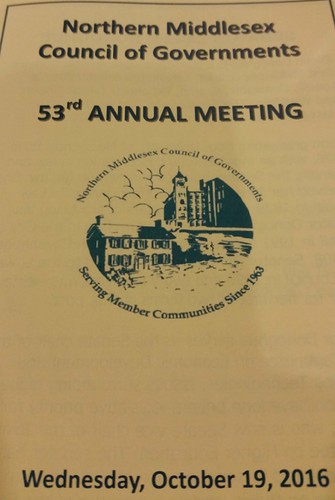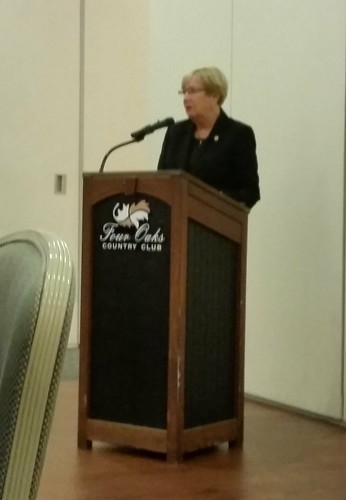Northern Middlesex Council of Governments annual meeting

The Northern Middlesex Council of Governments (NMCOG) had its 53rd Annual Meeting last night at Four Oaks Country Club in Dracut. The guest speaker was State Senator Eileen Donoghue. Her topic was economic development.

State Senator Eileen Donoghue
Donoghue began by saying the replacement of the Rourke Bridge “is a priority for the Lowell legislative delegation.” It is not just a matter of convenience, but also of safety and economic development.
Senator Donoghue then shifted to the outlook for the current fiscal year which is three months old. There is a deficit predicted and the governor is planning millions in emergency budget cuts, although these should not diminish local aid or the state’s response to the opioid crisis. The revenue picture is perplexing because job growth is up and unemployment is down, but sales tax receipts are also down and no one can pinpoint the exact reason why.
Donoghue then praised NMCOG as “a natural partner to legislators” that also provides immeasurable assistance to its member communities. It gives the communities planning help that allows much needed projects become a reality. Donoghue singled out NMCOG Executive Director Beverly Woods for special praise.
The next topic was the $1 billion state economic development bill. Donoghue explained that the bill contained 153 sections so she only shared some highlights. Above all, the bill promotes innovation, but part of that is job growth and job training, particularly in Gateway Cities like Lowell.
The biggest chunk of money, $500 million, is for the very popular Mass Works program which was started under Deval Patrick but greatly expanded by Governor Baker. Mass Works provides funding for infrastructure improvement that will promote economic development [note: Lowell has received Mass Works funding for work in the Hamilton Canal District].
Other funding is available for Brownfields Development and for “transformative development grants” which goes towards such things as Worker Hubs and Maker Spaces.
A portion of the bill that passed the legislature but that was vetoed by the governor would have created community Benefit Districts which would be public-private-nonprofit partnerships for economic development. These CBDs would be highly flexible, much more than traditional Business Improvement Districts, and would be grass roots, neighborhood-based, and would supplement local services. Despite the veto, the legislature continues to work to address the governor’s concerns, so Donoghue hopes this measure will eventually pass in some form.
Workforce development was the next item discussed. The economic development bill devotes $50 million to vocational education systems, which while very good, lack the capacity needed to train the number of new workers needed by our economy. A big task for the state is to align the skills of our residents with the jobs of the feature. Donoghue pointed to a partnership between a rail car manufacturer that recently opened a plant in Springfield and a local vocational high school there.
The final topic was housing. Donoghue said there is not enough of it for the workers we need for the jobs of tomorrow. This bill helps rehabilitate existing properties and build new ones. It contains incentives for the construction of market rate housing, but also $25 million to supplement the creation of “work force housing” which is intended to house people who work fulltime but are not paid a sufficiently high wage to afford market rate housing. Donoghue called this work force housing component “a game changer for Gateway Cities.”
Senator Donoghue closed by saying that the best thing state government can do is form partnerships with local government so that the state provides the tools and incentives needed to let municipalities get things done.
The Northern Middlesex Council of Governments is one of 13 regional planning agencies in the Commonwealth of Massachusetts. Its member communities, and the representatives from each, are as follows:
- Billerica: Andrew Deslaurier, Marti Mahoney, Mary McBride
- Chelmsford: Pat Wojtas, S. George Zaharoolis
- Dracut: Jesse Forcier, Philippe Thibault
- Dunstable: Walter Alterisio
- Lowell: Corey Belanger, Gerard Frechette
- Pepperell: Stephen Themelis, Michael Dapcic, Chuck Walkovich
- Tewksbury: David Gay, Nancy Reed
- Tyngsborough: Rick Reault, Steven O’Neill, Matt Hanson
- Westford: Don Siriani, Darrin Wizst, James Silva
There is perhaps no greater cause of fiscal struggle in our cities and towns than bad infrastructure “improvements”. NMCOG is prime mover in facilitating such projects as widening Nesmith St, widening of Rogers St at Shedd Park(sssshhhhh), the anti pedestrian redesign of the Bridge St/boulevard intersection, and new Rourke bridge.
All of these projects are about smoothing traffic flow which kills neighborhoods and stunts growth in Lowell. NMCOG might point to a new recreational path along the boulevard, which is great, but it won’t come at the expense of traffic flow. Traffic flow is king. Why are we so perplexed what the problem is?
Brian, all this is a good reason why we need to make sure that our city councilors are attuned to improving non-auto transportation modes. They appoint our representative to NMCOG. NMCOG, as our Metropolitan Planning Organization at the federal and state level, is the conduit through which federal and many state transportation dollars are funneled to use. Its oversight board is determined by community rather than by population, in other words its body is not representative of population. In this regards it is analogous to how Greater Lowell Technical High School was governed. as I understand it. I am not sure whether or not the LRTA gets their funding through them. I guess since NMCOG is not elected they are permitted to maintain a non representational body. The oversight of the LRTA seems even more Byzantine to me. I have no idea to whom they are responsible. Is Jim Scanlan a lifetime appointee, like a US Supreme Court Justice? Or does he serve at the board’s whim?
The way the governing body is made up makes it difficult direct their focus toward non-auto traffic. This can also be more difficult if Lowell’s representatives are more interested in auto transport than other modes. Despite all this, the state and city will listen, provided there is a loud enough outcry. This outcry, in my understanding, also needs to happen at just the right time in the process. We also need to make sure to maintain enough pressure. Local elections are quite important. Their outcome has many consequences. We need good solid candidates and voters to go to the polls for LOCAL elections, not just national elections.